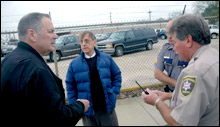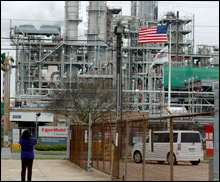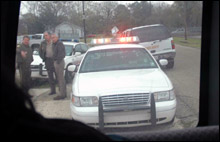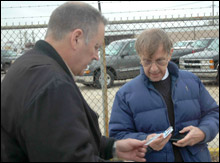
Stephen C. KowalWillie Fontenot (center) surrounded by ExxonMobil security guards.
After scoping out an ExxonMobil refinery in Baton Rouge last month, Willie Fontenot, a community liaison officer for the Louisiana attorney general’s office for 27 years, found himself faced with the option of forced retirement or getting the boot.
A longtime environmental-justice advocate, Fontenot had been accompanying a group of master’s students from Antioch New England Graduate School’s environmental-studies program on a tour of the neighborhood surrounding the facility, which in 1989 was the site of a massive explosion when a 500,000-gallon fuel-storage tank ruptured. He was showing the students an example of a neighborhood buyout — several blocks of homes near the refinery had been abandoned after the company paid their residents to relocate.
That particular controversy has long since blown over, but the ExxonMobil facility is just one of more than 50 petrochemical plants and oil refineries in the Mississippi Delta region between Baton Rogue and New Orleans, referred to by industry as “Chemical Alley” and locals as “Cancer Alley.” Louisiana has among the highest rates of cancer mortality in the nation, and many cases are concentrated in the communities near this strip of plants.

Stephen C. KowalA student snaps a photo of the ExxonMobil refinery.
The Bayou State is second only to Texas in terms of the volume of hazardous waste it generates from manufacturing, and “on a per-capita basis we have more toxic chemicals than any other state in America,” according to Florence Robinson*, a former biology professor from Southern University who won an award from the Heinz Foundation for her research correlating toxic pollution in Louisiana to the state’s demographics. “The areas in Louisiana that have the highest toxic-release discharges are well over 50 percent African-American,” said Robinson.
Fontenot has helped citizens in the Mississippi Delta and neighboring states organize more than 400 citizen groups to protect their communities against corporate polluters. “He is one of the most effective environmental-justice advocates in the region,” said Paul Templet, an environmental-studies professor at Louisiana State University in Baton Rouge. “There aren’t many people who have worked as long and hard as Willie to help people who can’t help themselves — the poorest of the poor — and that scares a lot of people in the government, especially here in Louisiana where the oil and manufacturing industries have a lot of political power.” Sierra Club President Carl Pope is also a fan: “Willie Fontenot has been a hero of mine since I met him in a bayou in 1984,” he said.
So it goes without saying that Fontenot is no stranger to ruffling corporate feathers and getting interrogated by security guards when he snoops around facilities. The latter is precisely what happened when he and the Antioch students approached the perimeter of the ExxonMobil plant. As Steven Chase, director of the Antioch environmental-studies program and leader of the student trip, recalls, “A group of rent-a-cops paid by Exxon come marching out and demanded to see the group’s IDs as the students were standing on the sidewalk snapping pictures of the facility. The guards announced that they were going to detain us and report our visit to the Department of Homeland Security.”

Stephen C. KowalThe rent-a-cops swoop in.
Because Fontenot had been careful to advise the students to stay on the sidewalk and not step on ExxonMobil property, he questioned the guards’ accusations that what they were doing was illegal, and that the photos students were snapping could in any way pose a security threat, given that they were taken from public property (not to mention that similar photos of the facility are available in ExxonMobil promotional material). He did, however, cooperate with the guards’ requests and eventually the group was allowed to continue on its neighborhood tour.
Two weeks later,* Fontenot got a call from the office of his boss, state Attorney General Charles Foti Jr., informing him that Foti wanted him to submit his resignation and clear out his office by 10 a.m. the following day. The alternative, he was told, was an appeal hearing that Fontenot said “would in all likelihood result in [me] being fired.”

Stephen C. KowalFontenot (right) hands over his ID.
“They gave me no reasoning whatsoever,” Fontenot told Muckraker. “They didn’t say we talked to Exxon, or a policeman, or a rain cloud of doom came overhead, or we had a premonition. They just told me to pack up and get out — this after 27 years of working in the agency.” He added that, because he’d been an unclassified civil servant, the attorney general is not legally required to give a specific reason for termination.
ExxonMobil spokespeople didn’t return Muckraker’s phone calls, and the attorney general’s office declined to comment about Fontenot’s dismissal. A spokesperson from the agency did, however, tell the Baton Rouge newspaper The Advocate that Fontenot had willingly submitted his resignation prior to the incident at the petrochemical plant.
“That’s patently false — I never submitted a resignation or intent to resign until I was asked to do so,” Fontenot said. As for why he did not opt to be fired, which would have enabled him to protest unjust termination, he said he can’t afford to lose his benefits and health insurance given that he is currently battling prostate cancer and a degenerative eye condition that has made him legally blind.

Stephen C. KowalThe flags wave and the factory flares.
Does Fontenot believe corporate honchos in Louisiana convinced the AG to have him terminated? “If they have a hit list, I am sure I would be at the top of it,” he said. “I am not aware of a campaign against me, but I know there are plenty of folks who resent the fact that there is somebody inside a government agency helping citizens organize.”
Justice may yet be served. Presumably in response to an outpouring of public support for Fontenot, generated from local news coverage and publicity campaigns by the Sierra Club and Antioch students, the AG’s office arranged a meeting with Fontenot yesterday to renegotiate his departure. “They seemed to be dangling out the possibility that maybe I could come back on a contracted basis,” said Fontenot. “But it was somewhat disconcerting that Attorney General Foti began the meeting by saying, ‘I heard you’ve retired,’ as if it wasn’t a decision under duress.”
Fontenot has been asked to return for a follow-up meeting in two weeks, at which point he will find out his fate — and residents of Cancer Alley will find out if they still have an advocate in the attorney general’s office.
*[Correction, 29 Apr 2005: This article originally misstated the name of the former Southern University biology professor. She is Florence Robinson, not Florence Williams.]
*[Correction, 29 Apr 2005: This article originally stated that Fontenot was asked to resign one day after leading the student field trip near the ExxonMobil refinery. In fact, it was two weeks later.]


